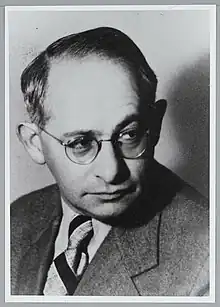
Uriel Birnbaum (November 13, 1894, in Vienna − December 9, 1956, in Amersfoort, Netherlands) was an Austrian painter, caricaturist, writer and poet.
Biography
Birnbaum was the youngest son of Nathan Birnbaum, a Jewish philosopher, and Rosa Korngut. Reportedly, his art education consisted of only one month at a Berlin art school in 1913.[1] He served in the Austro-Hungarian Common Army during World War I as a lieutenant in the k.u.k. Feldjäger Battalion No. 17,[2] and was severely injured during the Eleventh Battle of the Isonzo[3][4] where he completely lost one foot, and "shattered" the other;[3] he was confined to a wheelchair thereafter.
He illustrated a number of books, including works of Edgar Allan Poe, Lewis Carroll's Through the Looking-Glass (Alice im Spiegelglass, Vienna, 1923), and his own Weltuntergang[5] (1921).
Birnbaum survived the Nazi period at first due to the special status conferred to him by his non-Jewish wife (the Nazi concept of geschützte Mischehe, "protected mix-race marriage"; German article here), and then by going into hiding from 1943 until the end of the war in 1945.
References
- ↑ Timothy O. Benson et al., Expressionist Utopias, Berkeley, University of California Press, 2001; p. 193.
- ↑ "AT-OeStA/KA NL 1078 (B,C) 1078 (B,C) BIRNBAUM, Uriel, 1894.11.13-1956.12.09 (Bestand)". www.archivinformationssystem.at. Retrieved 2023-11-27.
- 1 2 Weixlgärtner, Arpad. "Der Maler-Dichter Uriel Birnbaum". Heidelberg University Library. Die Graphischen Künste #50, 1927.
- ↑ Birnbaum, Uriel. "In der Kaverne - Isonzo Front".
- ↑ "The End of the World."